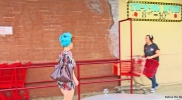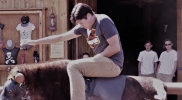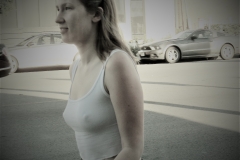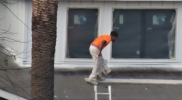|
|
Best Trivia - Life & Dealth
|
Favorite Trivia – DEATH & MOURNING
|
|
“It hurts to be a god; the door of death shut in my face, prolongs my grief forever.”
Inachus – Ovid’s Metamorphoses
|
|
Remember: “If you want to remember, tie a string around your finger; if you want to forget, tie a rope around your neck.”
Evan Esar – Esar’s Comic Dictionary
|
|
“All things that have been born were born to die.”
Lord Byron – Don Juan
|
|
“. . . Being brave lets no one off the grave.
Death is no different whined at than withstood. . .”
from Aubade by Philip Larkin
|
|
“The dead live in the memory of the living.” [Philippicae., IX, 5.]
Cicero
|
|
“What does it mean—you die? Perhaps man has a hundred senses, and at death it’s only the five we know of that perish, while the other ninety-five go on living.” [Trofimov]
Anton Chekhov – The Cherry Orchard
|
Latin: “Eripere vitam nemo non homini potest; At nemo mortem.” (Seneca)
English: “Any can rob me of the right to live; But none the right to die.” (trans. W. Francis H. King)
|
On Valentine’s Day, 1884, Theodore Roosevelt lost both his wife and his mother. He was at work in the New York state legislature attempting to get a government reform bill passed when he was summoned home by his family. He returned home to find his mother, Mittie, had succumbed to typhoid fever. On the same day, his wife of four years, Alice Lee, died of Bright’s disease, a severe kidney ailment. Only two days before her death, Alice Lee had given birth to the couple’s daughter, Alice.
|
“Even-handed Fate
Hath but one law for small and great:
That ample urn holds all men’s names”
Horace. C. 3, 1, 14, A Dictionary of Classical and Foreign Quotations – W. Francis H. King
|
“Mathilda Jones, a feisty ninety-eight-year-old maiden told the Houston Chronicle in 1987 that she wanted no male pallbearers at her funeral: ‘If men could not invite me out when I was alive, they’re not going to carry me out when I’m dead.'”
Henry Alford– How To Live: A Search for Wisdom from Old People
|
|
“Suicide is a permanent solution to a temporary problem.”
Ann Landers
|
|
“Memorial services are the cocktail parties of the geriatric set.”
Harold Macmillan
|
|
ANNIE ROSE
1867 1873
She was but 5 years, 20 days old
CALLED TO JOIN HER BROTHERS AND HER SISTERS
WHERE PARTING IS NEVER MORE
YOU HAVE THEM ALL NOW, LORD
Arlington, Massachusetts
|
|
“Jim often said he wanted to be buried like an outlaw, you know, the one that said, ‘I want to be buried face down so the whole world can kiss my ass.'”
Mortuary Confidential: Undertakers Spill the Dirt, ed. by Kenneth McKenzie and Todd Harra
|
|
“In Serbia the people have little jars to catch their tears in. All the tears shed at a funeral are caught in little tear-jars and buried with the dead. This is an honor to the dead in the afterworld, proving how greatly they are lamented on earth.”
Maria Leach – The Soup Stone: The Magic of Familiar Things
|
|
“Edwards, Book Collector, desired his coffin to be made out of some of the strong shelves of his library.”
Charles Lamb’s Scrapbook (Christopher Morley’s Book of Days for 1931 [January 15])
|
|
“Someday you’ll be lying
there in a nice trance
and suddenly a hot
soapy brush will be
applied to your face
—it’ll be unwelcome
—someday the
undertaker will shave you…”
Jack Kerouac
|
|
“For I am not at all regretful that I came into, and have so far passed my course in this world; because I have lived in it, that I have reason to believe I have been of some use to it; and when the close comes, I shall quit life as I would an inn, and not as a real home. For nature appears to me to have ordained this station here for us, as a place of sojourn, a transitory abode only, and not as a fixed settlement or permanent habitation.” [De Senectute., I, 23.]
Cicero
|
|
You got to move (song)
“You may be rich
You may be poor
But when the Lord calls
You got to move
You may be high
You may be low
But when the Lord calls
You got to move.”
Anonymous
|
|
“The Stoics sanctioned suicide as an escape from life’s evils.” [Epistles, I. XVI.]
Horace: Satires, Epistles and Ars Poetica, trans. by H. Ruston Fairclough
|
|
“We are all in a race for dear life: that is to say, we are fugitives from death.”
David Baird – A Thousand Paths to Enlightenment
|
|
“When we were alive—when Ray was alive—I did not read in bed, ever. . . Our evenings at home were spent in the living room, on our sofa, where at opposite ends of the sofa we read—or Ray copyedited manuscripts, or read page proofs—or I took notes on whatever it was I was writing at the time. . . Now, I have to wonder if I’d spent too much time in that other world—the world of my/the imagination—and not enough time with my husband…
“For this is the fact of the widow’s posthumous life—all things are equally profound as all things are equally trivial, futile, pointless. . .
“My loss is compounded by the somewhat unusual fact that Ray and I had no correspondence—not ever. Not once had we written to each other, for always we’d been together, virtually every night since our first meeting. . .
“The outdoor lights I never use for fear that soon they will burn out and I will have no idea how to replace them. Now the flurry of death-duties has abated, the siege is taking other forms. . . One by one regions of the house are becoming ghostly, unoccupied.
“Often Ray worked at this table. It was—it is—an ideal place to spread out photographs, galleys, page proofs. Passing along the gallery on the far side of the courtyard, I would look over and see my husband there—he would glance up at me—we would smile, wave. . .
“Better to be alive and nobody gives a damn about you than to be dead and ‘missed.’
“When you live alone, eating a meal carries with it an element of scorn, mockery. For a meal is a social ritual or it is not a meal, it is just a plate heaped with food. . .
“Thinking But I can’t live like this. I can’t live.”
Joyce Carol Oats – “The Siege” (The Inevitable: Contemporary Writers Confront Death, ed. by David Shields and Bradford Morrow)
|
|
“So much do I love wandering,
So much I love the sea and sky,
That is will be a piteous thing
In one small grave to lie.”
Zoë Akins
|
|
“When a man stands at the edge of a cliff, he is not worried that he might fall but that he might jump.”
Jean-Paul Sartre
|
|
In 2016, nearly 45,000 Americans 10 or older died by suicide. Guns were used in roughly half the suicides. Suffocation, including hanging, was the next most common method, followed by poisoning. Both Anthony Bourdain and Kate Spade committed suicide by hanging in 2018.
|
|
“When my husband was dying, I said: ‘Moe, how am I supposed to live without you?’ He told me: ‘Take the love you have for me and spread it around.'”
Unidentified woman in Brandon Stanton’s Humans of New York
|
|
“Death is the sad estranger of acquaintances, the eternal divorcer of marriage, the ravisher of the children from their parents, the stealer of parents from their children, the interrer of fame, the sole cause of forgetfulness, by which the living talk of those gone away as of so many shadows, or fabulous Paladins.”
William Drummond – A Cypress Grove
|
|
“No man is so old as not to think he can live one year more.”
Cicero
|
| “‘It happened on a Sunday when my mother was escorting my twin brother and me down the steps of the tenement where we lived,’ Joel-Peter Witkin once told an interviewer, recounting a pivotal moment from his childhood. ‘We were going to church. While walking down the hallway to the entrance of the building, we heard an incredible crash mixed with screaming and cries for help. The accident involved three cars, all with families in them. Somehow in the confusion, I was no longer holding my mother’s hand. At the place where I stood at the curb, I could see something rolling from one of the overturned cars. It stopped at the curb where I stood. It was the head of a little girl. I bent down to touch the face, to speak to it, but before I could touch it someone carried me away.'”
Lance Olsen – “Lessness” (The Inevitable: Contemporary Writers Confront Death, ed. by David Shields and Bradford Morrow)
|
| “They [native Indians in Connecticut] mourn for their dead by blacking their faces, and cutting their hair.” [October 7, 1704]
The Journal of Madame Knight – Sarah Kemble Knight
|
| Epitaph in New England graveyard:
“Dear friend, please know as you pass by,
As you are now, so once was I.
As I am now, so you will be.
Prepare yourself to follow me.”
Ram Dass – Still Here
|
|
“C.S. Lewis wrote after the death of his wife: ‘It comes from the frustration of so many impulses that had become habitual. Thought after thought, feeling after feeling, action after action had A. for their object. So many roads lead thought to A. I set out on one of them. But now there’s an impassable frontier post across it. So many roads once; now so many cul de sacs.'”
Joan Didion – The Year of Magical Thinking
|
|
“[In] Mexico City I saw a woman bullfighter killed. She chased the bull out of the ring, but he jumped back and when the audience yelled for her to look out, she thought they were applauding, and was gored while bowing to the stands.”
Maud Parrish – Nine Pounds of Luggage
|
|
“It was wintertime, and in my area of the country you can’t bury in the winter. Everyone gets stored in a vault until the spring thaw, which sometimes doesn’t come until early June.”
Mortuary Confidential: Undertakers Spill the Dirt, ed. by Kenneth McKenzie and Todd Harra
|
|
“On All Souls’ Day, or the Day of the Dead, among the Pueblos, the people leave their house doors open for the returning souls. Bowls of food are put out for them—and cigarettes. These have to be made of Mexican tobacco because the dead don’t like the new American kind.”
Maria Leach – The Soup Stone
|
|
“‘I think we should not under any circumstances underestimate the role of fear.’ [Sherwin Nuland author of ‘How We Die’]. . . ‘Fear of death. Fear of nonexistence. This concept of nonexistence: “The world will go on, and I will not be there” is a terrifying phenomenon to face. This is one of the reasons why I think it’s so important to reassure people that although the world will physically go on without them, that they have left a heritage or legacy. They’ve left something of value, and that part of that is love. . . ‘When I was in medical school, I was taught that one should never let a patient lose hope. But how do you define hope when in the usual sense there is no hope for survival?'”
Henry Alford- How To Live: A Search for Wisdom from Old People
|
|
“On the death of a friend, we should consider that the fates through confidence have devolved on us the task of a double living, that we have henceforth to fulfill the promise of our friend’s life also, in our own, to the world.”
Henry David Thoreau
|
| “A hairdresser talking with the Doctoresse about the bombing:
“I’m not afraid of it. The dead are better off than we are.”
“But you don’t know that.”
“Yes, I do. I’m sure of it because not a single one of them has ever returned.” [March 14, 1942]
A German Officer In Occupied Paris: The War Journals, 1941-1945 – Ernst Jünger (trans. by Thomas S. Hansen and Abby J. Hansen)
|
| Epitaph:
“Here lies Lester
Moore.
Four slugs
From a forty-four.
No Les
No More.” |
|
“That’s the problem with death. For everyone else, it’s an event, it’s sad and shitty and grief-inducing, but then life goes on. For the deceased, that’s it, that’s the end.” [July 29, 2016]
Mallory Smith – Salt In My Soul: An Unfinished Life
|
|
“He [Theodore Roosevelt, Sr.] looked so calm and sweet. I feel that if it were not for the certainty that, as he himself has so often said, ‘he is not dead but gone before,’ I should almost perish.
Theodore Roosevelt, February 12, 1878
|
|
death: “All men are cremated equal.”
Leonard Louis Levinson – Webster’s Unafraid Dictionary: Defiant Definitive Put-Downs
|
|
“When he [boxer-poet Arthur Cravan] fled to Mexico to avoid the draft, [Mina] Loy followed. They were married in Mexico City after her divorce from [Stephen] Haweis became final, then lived in poverty as Cravan fought (literally) to support them. When Loy became pregnant, they decided to move to Buenos Aires. Sailing separately, Cravan disappeared and was never seen again.”
100 Essential Modern Poems by Women – ed. by Joseph Parisi and Kathleen Welton
|
|
“… each morning, as you rise from your bed, the belief hums through your head that you are going to die, going to die, going to die, yes, surely, no doubt about it, but not today—an observation that will remain correct every morning of your life, except one, because— because—”
Lance Olsen – “Lessness” (The Inevitable: Contemporary Writers Confront Death, ed. by David Shields and Bradford Morrow)
|
|
“‘Just as there never died a man,’ said he,
‘But had in life some station or degree,
Just so there never lived a man,’ he said,
‘In all the world but in the end was dead.
This world is but a thoroughfare of woe
And we are pilgrims passing to and fro…'”
Geoffry Chaucer – The Knight’s Tale: Canterbury Tales (trans. by Nevill Coghill)
|
|
“An odd by-product of my loss [Lewis’s wife] is that I’m aware of being an embarrassment to everyone I meet. At work, at the club, in the street, I see people as they approach me, trying to make up their minds whether they’ll ‘say something about it’ or not. I hate it if they do, and if they don’t. Some funk it altogether. R. has been avoiding me for a week. I like best the well brought-up young men, almost always boys, who walk up to me as if I were a dentist, turn very red, get it over, and then edge away to the bar as quickly as they decently can. Perhaps the bereaved ought to be isolated in special settlements like lepers. To some I’m worse than an embarrassment. I am a death’s head. Whenever I meet a happily married pair I can feel them both thinking. ‘One or other of us must some day be as he is now.'”
C.S. Lewis – A Grief Observed
|
|
“What could lend meaning to the AIDS crisis in America? Hundreds of thousands perished because there was no medical model for understanding what was wrong with them, and no money or concerted effort offered soon enough to change the course of things in time to save their lives. They died of a virus, and they died of homophobia. . . AIDS makes the experience of the body, a locus of pleasure and satisfaction, almost simultaneously the site of destruction and limit.”
Mark Doty – “Bijou” (The Inevitable: Contemporary Writers Confront Death, ed. by David Shields and Bradford Morrow)
|
|
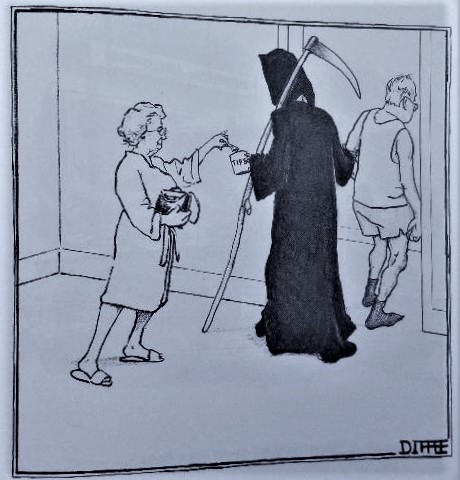
|
|
“THE ONLY THING more tragic than a death is a death that could have been prevented.”
Colette Moore (registered nurse)
|
|
“What embitters me is the humiliation of having to die, to have to be pouring out the precious juices of my life into the dull Earth, to be no longer conscious of what goes on, no longer moving abroad upon the Earth creating attraction and repulsions, pouring out one’s ego in a stream. To think that the women I have loved will be marrying and forget, and that the men I have hated will continue on their way and forget I ever hated them—the ignominy of being dead! What voluble taker likes his mouth to be stopped with earth, who relishes the idea of the carrion worm mining in the seat of the intellect?” [May 25, 1913]
The Journal of a Disappointed Man – W. N. P. Barbellion
|
|
“There is a remedy for everything except death.”
Don Quixote
|
|
“Pray for a healthy mind in a healthy body, a spirit
Unafraid of death, but reconciled to it, and able
To bear up, to endure whatever troubles afflict it,
Free from hate and desire.”
The Tenth Satire: On the vanity of human wishes (The Satires of Juvenal – trans. by Rolfe Humphries)
|
|
“Luxury need not look on early death as a terror;
What extravagance dreads is old age, more fearful than dying.”
The Eleventh Satire: With an invitation to dinner (The Satires of Juvenal – trans. by Rolfe Humphries)
|
|
“The only positive aspect about committing suicide is at least you know when and how you will die.”
Patty Martino Alspaugh
|
|
“I have an affection for your voice,
and a desire for your company
but a complaint of melancholy
for the absence of your presence. . .”
Miguel Hernández (trans. by Timothy Baland)
|
| “The boys are afraid that I am going to die. They don’t let me stay alone. When one goes out, the other comes to watch over me. They said: ‘I want to be near you, because when Death arrives I want to give her a beating.’” [January 20, 1959]
Carolina Maria de Jesus – Child of the Dark
|
|
Dr. Atkins, the diet doctor, died when he slipped on the icy pavement and couldn’t get up because he weighed 300 lbs.
Marilyn Johnson – The Dead Beat
|
|
“Nothing seems so tragic to one who is old as the death of one who is young, and this alone proves that life is a good thing.”
Zoë Akins – The Portrait of Tiero
|
|
The 2nd and 3rd Presidents of the United States, John Adams and Thomas Jefferson, died July 4, 1826, 50 years after both signed the Declaration of Independence.
The Dead Beat – Marilyn Johnson
|
|
“I used to claim that I was afraid of dying and not of death. It was the process I dreaded, not the result. I didn’t want to suffer pain, look ugly, or feel panicked and helpless. I hoped not to undergo a long, drawn-out illness like cancer because then I would have to think about my death for months, be required to read confusing medical pamphlets, and make ‘informed decisions,’ only to delay the inevitable. I wouldn’t mind being dead, I insisted, if I could die suddenly, unexpectedly, painlessly, and (perhaps most important) unknowingly from a heart attack or a tree falling on my car. Or in my sleep in very old age. . . Sometime in my forties, I came to admit the truth: the main problem with death isn’t dying but being dead. Much as I’m afraid of the process, the result is unimaginably worse.”
Kyoki Mori – “Between The Forest And The Well: Notes On Death” (The Inevitable: Contemporary Writers Confront Death, ed. by David Shields and Bradford Morrow)
|
|

“Silent Sunday. . .
“The luxury Mercedes bearing four from the Ritz was now a bundle of twisted metal facing the direction it had come from. Gray smoke from its engine mingled with petrol fumes and a metallic smell of burning. Its horn blared ceaselessly into the night, jammed by the dead body of the driver, Henri Paul, pinioned on the steering column by the impact of a direct collision with the thirteenth of the tunnel’s concrete pillars at sixty-eight miles an hour.
“The Princess of Wales, Dodi Fayed, and their bodyguard Trevor Rees-Jones had been flung violently around as the car rebounded from the impact and hurtled spinning across two lanes into the right tunnel wall. Diana lay crumpled on the floor of the wreck, doubled up with her head wedged between the two front seats and facing the back. . .
“Diana was having difficulty breathing. [Dr. Frederic] Mailliez ran back to his car, grabbed an oxygen mask and tank from his trunk, and raced back to lift her head and gently fit the mask. She resisted, ‘moaning and gesturing in all directions.’ When she cried out, he knew she was English. ‘She kept saying how much she hurt.’ . . .
“Officer Sebastien Dorzee and his partner, Lino Gagliardone, headed toward Place d’Alma along Cours Albert Premier in response to a radio alert . . . Gagliardone radioed for backup from the patrol car while Dorzee ran to the Mercedes, reached the rear door, and took over briefly from Dr. Mailliez. It was exactly 12:30 A.M. Dorzee recognized the Princess of Wales. Her eyes were open. She uttered something ‘in a foreign language’—he thought it was ‘My God,’ in English. She turned her head and saw the lifeless Dodi just in front of her, then turned her head again toward the front where the bodyguard was writhing and Henri Paul lay dead. She became agitated, then lowered her head and closed her eyes. . .
“[Dr. Arnaud] DeRossi consulted with SAMU Control on the best way of treating Diana while Dr. Martino examined her. He found her conscious but incoherent and confused. She struggled as he put her on an intravenous drip for the trip to hospital. Her right arm was bent and dislocated, making her removal from the car a delicate operation . . . At 1:41 A.M., Dr. Martino directed the ambulance to head for the Pitié-Salpêtrière Hospital, situated on the Left Bank beyond the cathedral of Notre Dame. It was a journey of 3.8 miles—ten minutes in normal traffic. . . The Police cleared all the roads. . .
Beyond the great, wrought-iron gates, Diana was lifted out . . . . Inside the Pavilion Cordier, the battle for Diana’s life was frantic but controlled. X-rays revealed she was bleeding in the chest cavity, compressing her heart and right lung. They drained the blood and gave her a massive transfusion, but at 2:10 A.M. her heart stopped again. Dr. Riou and Dr. Moncef Dahman began at once to open Diana’s chest to find out the cause of the bleeding. Professor Pavie arrived and the Princess was transferred to the operation theater. Pavie enlarged the opening. Now they found a tear in the upper left pulmonary vein caused when the velocity of the crash had displaced the heart from left to right. They stitched the tear. The bleeding stopped, but Diana’s heart gave up again. For an hour they tried direct massage, adrenaline, direct stimulation, and several microvolted defibrillations. . .
“She was pronounced dead at 4 A.M.”
Tina Brown – The Diana Chronicles
|
|

“The evidence is that both Diana and Dodi would have survived had they been wearing seat belts; Trevor Rees-Jones, who did survive, suffered his dreadful injuries because, though cushioned on impact by the front air bag, his failure to buckle up allowed him to be hurled sideways against the interior. Henri Paul should never have been the driver of that car on the fatal night of August 31—if Diana had not refused police protection from Scotland Yard he never would have been. . . Paul was not even a qualified limousine driver. . . His former boss [at the Ritz Hotel] Jean Henri Hocquet said ‘Monsieur Paul was simply nice, and as an act of friendship and because of his good nature, he could not say ‘no’ [to the boss’s son].’
Tina Brown – The Diana Chronicles
|
|
“In his essay ‘Mourning and Melancholia,’ he [Freud] suggests that mourners have to reclaim the energy they have invested in the deceased loved one. Grieving is that process of reclamation. When you lose someone you were close to, you have to reassess your picture of the world and your place in it. The more your identify is wrapped up with the deceased, the more difficult the mental work. . .
“Grief requires acquainting yourself with the world again and again; each ‘first’ causes a break that must be reset. I knew, already, that the next time I visited the ocean, I would not be gutted like this. In this sense, my mother’s death was not a single event, but a whole series of events—the first Easter without her; the first wedding anniversary without her; the first time Eamon, who has epilepsy, had a seizure and she was not here to calmly take charge. The lesson lay in the empty chair at the dinner table. It was learned night after night, day after day.”
Meghan O’Rourke – The Long Goodbye
|
|
“To stand upon one’s guard against Death exasperates her malice and protracts our sufferings.”
W. S. Landor
|
|
“. . . That is when suicide comes. It comes when the shadow part of let’s say the part of you that you hate starts to take over and fill up or push out all the other parts until you are all the part that you hate and there is this one little part left that is the killer and the killer is closely related to the self hate and at last it does its dirty little deed.” [April 1, 1995]
The Journals of Spalding Gray
|
| “Funeral. It is not death but the dreadful possibilities of life which are so depressing.” [September 18, 1911]
W.N.P. Barbellion – The Journal of a Disappointed Man & A Last Diary
|
|
“Doctors call motorcyclists, ‘Donors.’”
Marilyn Johnson – The Dead Beat
|
|
“Many doctors in China are not allowed to retire, and some of them have never even had a vacation. This woman announced that she had a retirement plan: she would pretend to die, have herself nailed into a coffin and driven to her home village, then climb out during the funeral and declare herself a ghost. ‘Then I could have a garden and take care of my grandchildren.'”
Mark Salzman – Iron & Silk
|
|
“I feel that on my deathbed, which is something I hope to eventually have, I’ll probably look back and wish that I didn’t always look on the dark side of everything. But how can you not? You could die at any time, for any reason. You’re walking under an air conditioner, and Kaboom! My parents actually knew someone who was killed by a falling flower pot. But we have to kind of go along and put one foot in front of the other and pretend that we don’t know that everything could take a serious turn for the worse in the next second.”
Roz Chast (Poking a Dead Frog: Conversations with Today’s Top Comedy Writers – Mike Sacks
|
|
“One of the grubby truths about a loss is that you don’t just mourn the dead person, you mourn the person you got to be when the lost one was alive.”
Meghan O’Rourke – The Long Goodbye
|
|
“‘I miss your grandpa. For years, I missed him all the time.’
‘Do you still miss him?’ I said.
‘Yes,’ she said quietly. ‘Mostly I’m just sorry about everything he doesn’t get to see and do.'”
Meghan O’Rourke – The Long Goodbye
|
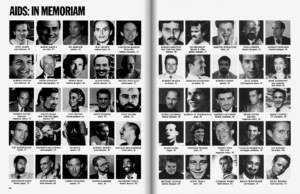
“Some of the new homeless aren’t like others. They are New York’s own version of Bombay’s lepers: hollow eyes, hollowed out, on their way to the next world before they’ve entirely left this one. They are the AIDS sufferers, the ones who can’t afford to hide and go quietly. Everyone in the universe of New York culture has friends who suddenly start to fade, whose paths have been horrifyingly diverted. I seem to always be at funerals. In December a dancer’s death was reported every single day in one week, each with the same melancholy indicators—death at an early age after an unnamed illness, with parents and siblings listed as survivors.
“I assigned a piece for the March issue on the toll of AIDS on the arts and fashion. No one has yet gathered up a gallery of faces of all those who have died and denuded us of their talent, and we have done it in a haunting double-page spread. I asked our new hire Michael Shnayerson, who was the editor of Avenue, to report it out. He’s a young straight guy who lives in the West Village and who until this assignment was oblivious to AIDS. Now, reporting the piece, he says it’s been like stepping into a war zone.” [January 3, 1987]
Tina Brown – The Vanity Fair Diaries
|
| “We once received a letter from a young woman who wanted us to know, and hoped we wouldn’t be mortified by the fact, that she had surreptitiously placed her father’s ashes in various nooks and crannies throughout our poetry room. She said it was her father’s favorite place in the world and she was comforted by knowing he was there.”
Stacey Lewis, City Lights (Footnotes From The World’s Greatest Bookstores – Bob Eckstein)
|
How hard it is to lose this friend
so dear
With no farewells—too soon
we were bereft.
How quickly he made friends
with Death, and left!”
Eulogy by California poet laureate Charles “Gus” Garrigus (1966-2000)
|
| “Our host, poor Dudley is lovable and yet so moody and irritable; people say that accidents only happen to others but look at him, his mother drowned, his little boy run over and killed on the Embankment, and his charming wife killed in an aeroplane disaster along with Dufferin in 1930.” [January 26, 1935]
Sir Henry Channon – Chips: The Diaries of Sir Henry Channon
|
| 49 Days of Mourning:
Buddhist calendar: 49 bardo days of chants and ritual meditation that assist the dead on their journey to the next life.
Jewish calendar: The Counting of the Omer: 49-day period of mourning outside of the week-long Shivah, between Passover and Shavuot, practiced as a time for reflection and inner growth to eventual atonement and renewal. |
| “I thought of what the painter Dora Carrington wrote in her journal after her beloved, the writer and critic Lytton Strachey, died in 1932: ‘I dreamt of you again last night. And when I woke up it was as if you had died afresh. Every day I find it harder to bear. For what point is there in life now?. . . I look at our favorites, I try and read them, but without you they give me no pleasure. . . It is impossible to think that I shall never sit with you again and hear your laugh. That every day for the rest of my life you will be away.'” [Strachey died January 21, 1932. Carrington committed suicide on March 11, 1932.]
Meghan O’Rourke – The Long Goodbye
|
|
July 2, 1961, at age 61, Hemingway shot himself with a double-barreled Boss shotgun. He lowered the butt to the floor, leaned forward, pressed the twin barrels against his forehead and tripped both triggers.
Baker – Hemingway
|
|
Robert Opel, the nude streaker who ran across the stage behind David Niven during the 1974 Oscar telecast, was murdered 5 years later during a robbery at his art gallery, Fey-Way Studios (in San Francisco), the nation’s first openly gay art gallery.
|
“The Dead are like the stars by day;
Withdrawn from mortal eye,
But not extinct, they hold their way
In glory through the sky.”
James Montgomery
|
Parul Sehgal when reviewing Lorrie Moore’s book, Bark, in Book Forum references Moore’s humor in Birds of America: ‘Found among the rubble of a plane crash are severed crossed fingers.’
Lorrie Moore – Birds of America
|
“The raging promiscuity he [Joe Orton] enjoyed and detailed with such delight in his diaries eventually incited such jealousy in his longtime lover, Kenneth Halliwell, that he [Halliwell] clubbed him [Orton] to death. Orton was only thirty-four.
Terry Newman – Legendary Authors and the Clothes They Wore
|
|
FAMOUS LAST WORDS:
“Drink to me” – Picasso
“I only regret that I have but one life to lose for my country.” – Nathan Hale
“This is the last of earth! I am content.” – John Quincy Adams
“Life is so beautiful” – Don Corleone (The Godfather)
|
John Fulton, Philadelphia born artist/bullfighter painted pictures of bulls he had slain using their blood.
Marilyn Johnson – The Dead Beat
|
“Four or five days after she died, I sat alone in the living room wondering what to do. Shuffling around, waiting for shock to give way, waiting for any kind of structured feeling to emerge from the organizational fakery of my days. I felt hung-empty. . . The doorbell rang and I braced myself for more kindness. Another lasagna, some books, a cuddle, some little potted ready-meals for the boys. Of course, I was becoming expert in the behaviour of orbiting grievers. Being at the epicenter grants a curiously anthropological awareness of everybody else, the overwhelmeds the affectedly lackadaisicals, the nothing so fars, the overstayers, the new best friends of hers, of mine, of the boys. The people I still have no fucking idea who they were.”
Max Porter – Grief Is the Thing with Feathers
|
“We all used to get in a lot of trouble from Mum for flecking the mirror with toothpaste. For a few years [after her death] we flecked and spat and over-brushed and our mirror was a white-speckled mess and we all took guilty pleasure in it. . . Various other things slipped. We pissed on the seat. We never shut drawers. We did these things to miss her, to keep wanting her.”
Max Porter – Grief Is the Thing with Feathers
|
|
In 1963, Sylvia Plath—distraught over her husband’s [Ted Hughes’] very public affair with Assia Wevill (who was married at the time to her third husband, poet David Wevill)— committed suicide by putting her head in an oven and turning on the gas. Sylvia Plath was 30 years old.
In 1969—aggrieved over Ted Hughes’ refusal to marry her as well as his affairs with others including Carol Orchard, a nurse twenty years his junior whom he later married (1970)—Assia Wevill committed suicide in a similar vein as Plath, with one major difference. Plath protected her and Ted’s two children, Freida and Nicholas, from the gas-filled room; Assia gassed herself and her & Ted’s four-year old daughter, Shura. Assia Wevill was 41 years old.
In 2009, Plath’s and Hughes’ son Nicholas hanged himself. Nicholas Hughes was 47 years old.
|
Tombstones: The Very Rich Man
“He’d have the best, and that was none too good;
No barrier could hold, before his terms.
He lies below, correct in cypress wood,
And entertains the most exclusive worms.”
The Collected Poetry – Dorothy Parker
|
“If there’s no wine in heaven, I shall not go there.”
Mark Twain
|
“Have been reading Sir Oliver Lodge’s Raymond. I do not deny that I am curious about the next world, or about the condition of death. I am and always have been. In my early youth, I reflected continually on death and hated it bitterly. But now that my end is near and certain, I consider it less and am content to wait and see. As, for all practical purposes, I have done with life, and my own existence is often a burden to me and is like to become a burden also to others. I wish I possessed the wherewithal to end it at my will. With two or three tabloids in my waistcoat pocket, and my secret locked in my heart, how serenely I would move about among my friends and fellows, conscious that at some specially selected moment—at midnight or high noon—just when the spirit moved me, I could quietly slip out to sea on this Great Adventure.” [March 8, 1917]
The Journal of a Disappointed Man – W. N. P. Barbellion
|
|
Proverb: Be happy while you’re living, because you’re a long time dead.
|
| “The young may die, but the old must!”
Henry Wadsworth Longfellow
|

“The reality is that Zelda and F. Scott Fitzgerald lived a devastating dream. Scott Fitzgerald suffered a heart attack and died in Hollywood at age forty-four while trying to work as a screenwriter and to write his last, unfinished book, The Love of the last Tycoon. At forty-seven Zelda died in a fire at Highland Hospital in Asheville, North Carolina, while undergoing treatment for mental illness.”
Legendary Authors and the Clothes They Wore – Terry Newman
|
| “Moving on, as a concept, is for stupid people, because any sensible person knows grief is a long-term project. I refuse to rush. The pain that is thrust upon us let no man slow or speed or fix.”
Max Porter – Grief Is the Thing with Feathers
|
| “I can never think of death without shuddering at this idea of mine. Death will necessarily come, from ordinary causes. It is inevitable, and one’s whole life is a preparation for it, an event as natural as the fall of raindrops. I cannot resign myself to that thought. Why not seek death of one’s own free will, asserting one’s right to choose, giving it some significance? Instead of passively letting it happen? Why not? Here’s the reason. One always puts off the decision, feeling (or hoping) that one more day, one more hour of life, might also prove an opportunity of asserting our freedom of choice, which we should lose by seeking death. In short, because one thinks—and I speak for myself—that there is plenty of time.” [November 30, 1937]
The Business of Living: Diaries 1935-1950 – Cesare Pavese
|
|
|
| “Man is literally split in two: he has an awareness of his own splendid uniqueness in that he sticks out of nature with a towering majesty, and yet he goes back into the ground a few feet in order to blindly and dumbly rot and disappear forever. It is a terrifying dilemma to be in and to have to live with. The lower animals are, of course, spared this painful contradiction, as they lack a symbolic identity and the self-consciousness that goes with it. They merely act and move reflexively as they are driven by their instincts. They live in a world without time, pulsating, as it were, in a state of dumb being. This is what has made it so simple to shoot down whole herds of buffalo or elephants. The animals don’t know that death is happening and continue grazing placidly while others drop alongside them. The knowledge of death is reflective and conceptual, and animals are spared it. They live and they disappear with the same thoughtlessness: a few minutes of fear, a few seconds of anguish, and it is over. But to live a whole lifetime with the fate of death haunting one’s dreams and even the most sun-filled days—that’s something else.”
Ernest Becker – The Denial of Death
|
| Mephistopheles:
“. . . Frankly, for the dead
I never hankered much; instead
I’d rather have a cheek quite plump and red.
I’m out if ever a corpse comes to my house;
I act just as a cat does with a mouse.”
Faust – Goethe, trans. Alice Raphael
|
| “A family from out of town has been living for a while in Jogo da Bola Street. . . We learned that the old man is a farmer in Serro and is called Botelho, and the girls, there are four of them, go by the name of ‘the Botelhos.’ They pass the time in the window or sitting on chairs on the sidewalk in the afternoons. They don’t seem to do anything. When we go by we speak to them and they always answer pleasantly. . . Going by there recently one afternoon we saw on their house the hangings for someone who’s died, the doors covered with black cloth trimmed with gold galoon. My aunt thought we should go in, so we did. It was the rich, oldest one lying in the coffin, looking just like someone sleeping without snoring. She really seemed to be sleeping peacefully. Her sisters told us that her death had begun with a heavy sleep. Then, when she didn’t wake up, they saw she was dead. The sisters had such cheerful expressions that it didn’t seem as if there were a death in the house. We left commenting on the sisters’ cheerfulness and my aunt said, ‘It’s because the other one was rich. It’s money that destroys family feeling.’
The funeral didn’t take place that day. When we went by the door the next day the black hangings were gone. We were intrigued, and couldn’t understand what they’d done with the remains. I said to myself, ‘This mystery has to be cleared up. I have to go by that door until I find out, even if I wear out a boot.’ We had our eyes glued on the house and we saw the cook go out to go to the store. I ran, said good-day to her, and asked her why the funeral hadn’t taken place. ‘Then the Senhora doesn’t know yet?’ ‘No!’ I answered. ‘What happened?’ ‘Siá Donana came back to life.’ ‘What? Then she wasn’t dead?’
‘Dead she was, that is, she wasn’t, but she looked as if she was. I think somebody made something [witchcraft], but we shouldn’t speak of that. . . Siá Donana said that she lay in her coffin in a rage, hearing her sisters fighting over her things. They fought over the cows, the silver, everything. But it was a strange thing. The men picked up the coffin; it was very heavy and they let it fall on the floor to get a better hold on it. The coffin hit the floor hard and the defunct woke up. The Senhora can’t imagine what it was like! The shock of her coming to life was worse than the shock of her death. She woke up and started fighting with her sisters and ordering them out of the house because she said that instead of crying for her death they’d just fought over her things. She’s already sent for their father to come and take them back to the fazenda and she’s going to live here alone. The girls have barred themselves in the bedroom and they don’t even come out to eat. We expect their father any minute, to take them away. And that’s what happened when Siá Donana died.'” [June 13, 1895]
Alice Dayrell Caldeira Brant – The Diary of “Helena Morley”
|
Comments are closed.
|
|


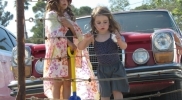



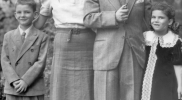
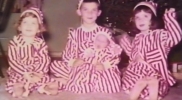




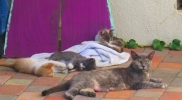

![[000015] [000015]](https://beforetheblog.com/wp-content/gallery/kids/thumbs/thumbs_000015.jpg)
